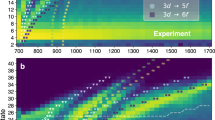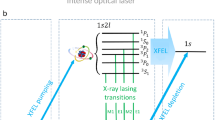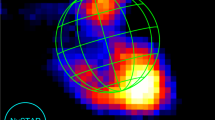Abstract
IN the note above by G. K. Das and one of us (B.D.), it has been pointed out that the transition potential as defined therein with positive rays of hydrogen for the Hα line should be about 7,000 volts. We have carried out a systematic investigation with this line, the current being kept constant at all potentials with times of exposure varied within wide limits. The results are shown in Fig. 1.
This is a preview of subscription content, access via your institution
Access options
Subscribe to this journal
Receive 51 print issues and online access
$199.00 per year
only $3.90 per issue
Buy this article
- Purchase on Springer Link
- Instant access to full article PDF
Prices may be subject to local taxes which are calculated during checkout
Similar content being viewed by others
References
Joos, G., and Kulenkampff, Phys. Z., 25, 1 (1924).
Bartels, H., Ann. Phys., 13, 373 (1932).
Mcpherson, Anna I., Phys. Rev., 45, 485 (1934).
Author information
Authors and Affiliations
Rights and permissions
About this article
Cite this article
DASANNACHARYA, B., DAKSHINAMURTI, C. Ionization Potential and Doppler Effect in Hydrogen Positive Rays. Nature 154, 22–23 (1944). https://doi.org/10.1038/154022a0
Issue Date:
DOI: https://doi.org/10.1038/154022a0
This article is cited by
-
Physics and physicists at Banaras Hindu University: circa 1916–1960
Indian Journal of History of Science (2022)
-
Triatomic Hydrogen and Doppler Effect in Hydrogen Positive Rays
Nature (1947)
-
Role of Line-Width in the Measurement of the Doppler Displacements in Positive Rays
Nature (1946)
Comments
By submitting a comment you agree to abide by our Terms and Community Guidelines. If you find something abusive or that does not comply with our terms or guidelines please flag it as inappropriate.



